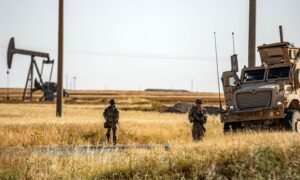
How did Syrian investments in Britain avoid the repercussions of
Economic policies between Syria and Britain amid fluctuations and crisis

Printed Edition ‖ Economy reports ‖ No.: 230
When the Chief Executive of UK Trade and Investment, Andrew Cahn, came to Damascus in 2010 to participate in the launch of the joint Syrian–Britain businessmen Council, he thought, coming along with more than 50 businessmen and investors in different fields, that Syria is a fertile land and an attractive environment for British investments and that they can get a lion’s share in the projects in line with Syria’s transition from a socialist to a market economy, after socialist economy became history in the era of the Syrian regime president, Bashar al-Assad.
Cahn, during the Council launch, called for serious work in order for this initiative to succeed with joint aspirations to increase the volume of trade and investments between the two countries, saying “we know of the good quality Syrian products in the textile and fabric fields, we also have a lot of Syrian students in Britain and we hope that this council will prompt the dual relations into better levels.”
The British desire in diversifying and enhancing investments in Syria came rather late and post-improving the relation between Damascus and London, it was not up to the level that the Syrian businessmen aspired to, who in fact took the initiative of the idea to launch the Council, and who sought to invite the British to invest in Syria despite the tremendous potentials that Syria owned in different fields, and that was due to the “disinterest” on the British side as well as, the apathetic to launch any projects in Syria during the era of Assad the father and later in the era of his son, for many reasons, some of which are; the US sanctions that led the holders of capital to be skeptic in the feasibility of any project on Syrian lands, which led to limited entry of huge British banks to Syria during the banking boom that Syria witnessed between 2005 – 2010.
In return, Syrian investments continued in the other direction; limited and bound to certain Syrian-British personalities, it focused on the field of real estate and services, and to a limited extent the banking sector.
The tenuous Syrian investments in Britain, as well as in other countries in the world, was part of the problem the Syrian economy suffered from, which was the integration within the global economy, and not opening the local markets to foreign companies and investors, and that was part of the economic policy mainly relating to the political decision.
As a result, and due to the delay in promoting trade and investments on both sides, the exchange between Syria and Britain continued to be small, and the Syrian imports dropped to lowest levels with less than a 150 million pounds, and exports with around 40 million pounds, according to what the President of Syrian-British Business Council, Nashaat Sanadiki, announced.
Syrian investments in Britain
At the time when the British started to realize the advantage of investing in Syria, and began to make plans and facilities in order to enhance the Syrian investments, the Syrian revolution broke out, therefore, Britain, along with the rest of EU countries, ceased relations with Damascus, and development plans were “suspended” in the hope of solving the Syrian crisis politically, and resuming development plans.
The Syrian investments in Britain continued at that time, founded by well-known businessmen, who have paved the way for relations between Britain and Syria before 2011 and established huge investments in there that were mainly in the fields of oil, real estate and banking, however, these investments continued to be “small and limited”, as Mohammed Hussam Helmi, the economic researcher says, compared to the capital and Arab investments, especially Gulf ones, estimated at around 250 billion USD, most of which were in the field of real estate, as the center of London is considered the most important investment destination for businessmen coming from the UAE and Qatar.
The British vote to exit the European Union (BREXIT) put forward many questions regarding the fate of Arab investments in Britain including the Syrians, and how would these be affected in the short run, however, due to “political uncertainty” in Britain about the future of the country, answers will only be unresolved speculations, and the effect of the British exit from the EU might be little on these investments because of their volume, as well as, their diverse fields, such as the real estate that hugely attracts Gulf funds.
The researcher Helmi believes that British exit from the European Union will take place transitionally over two years, which will decrease the impact on the investments by any political repercussions. In the short run, the British exit will have direct effects, like the devaluation of the sterling pound due to the instability prevailing in the money market and the business sector, in addition to the exit of a number of direct investments.
The impact on the Syrian Central Reserve
Central Bank of Syria linked the lira to the Special Drawing Rights (SDR) and disengaged it from the USD. The sterling pound is one of components of the rights units, along with the euro, Japanese yen and the USD, however, after five years of conflict, the figures of the International Monetary Fund suggest that the Central Syrian has consumed the stockpile of 18 million dollars respectively, thus, the global sterling decline has no impact on the Syrian reserve, which is denominated by the dollar and linked to the SDR, and is about to be drained.
In regards to Arab investments, including the Syrian ones that entered Britain due to wars in the Middle East, “there is no expectation at this moment whether these investments would increase or decrease after the exit phase”, according to Helmi.
The researcher added there will be effects on the long run on all foreign investments, “because there is fear of a decline in growth in Britain due to expected changes regarding trade agreements, freedom of movement, as well as the trade exchange movement. On the other hand, the exit supporters (out of the EU) expect it to provide more working opportunities and reduce the level of unemployment, after the European workers leave.”
Loss volume is unknown
Economic journalist, Sameer Taweel, explained to Enab Baladi, that the policy adopted by Syrian businessmen in diversifying their investments and avoiding limiting them to one country, saved them losses and crisis’ consequences for whatever reasons. In the case of Britain, and because there is no figure for the volume of Syrian investments in there, defining the losses remains unknown. However, despite the losses to afflict the British economy, Britain will continue to maintain their relations with EU countries and other countries in the world, pointing that impacts will affect investments in real estate and stock market fields, while there will not be significant impacts on trade exchange between Britain and the world.
Taweel believes that Syrian “real” investments in Britain, whether it be in real estate or stock market will be affected in one way or another, as there are no other investing fields for Syrians in the industry or agricultural fields.
Nature of investments in Britain
With the outbreak of the Syrian revolution, each of the European Union and the US imposed strict sanctions on the Syrian regime, and in fact the relation of the Union with Syria was severely damaged. It is known that Syria is number one trade partner of the Union in the region, the Syrian exports to the EU countries constituted 50% of the total exports, the oil sector was the number one beneficiary of directing 40% of Syrian Oil exports to Germany and Italy, however, with the sanctions imposed, these number evaporated and everything stopped.
Despite the limited British projects in Syria and their humble numbers, yet they represented important figures in the foreign investments record in Syria, mostly in the oil field, like the “Gulf Sands Petroleum” company, “Shell – Syria” for oil development, “Antaradus” project in Tartus and many transport, services, and infrastructure companies that implement projects in Syria through undertakings or partnership with local operators.
The Syrian government realized back then the importance of enhancing the numbers of British investments, driven by a common desire on both sides to improve economic relations, so they placed the eleventh five-year plan, prior to sanctions, in the Ministry of Industry with strategic plans aiming at increasing the Syrian manufactured exports with a ratio of 10% on a yearly basis, as well as attracting 50 billion Syrian pounds (the USD = 50 Syrian pound at that time) in the field of industrial investments in order to create 50 thousand working opportunities annually.
The ministry removed the obstacles that hinder work and encouraged partnership with private industry sector, and allowed opportunity for the British to invest in the fields of renewable energies, food, textile, chemicals and pharmaceutical industries, however, these “encouraging” plans to invest were rapidly for no avail with the outbreak of the revolution and the investors’ refrainment with their capital from coming to Syria, since it has become a non-safe country.
if you think the article contain wrong information or you have additional details Send Correction
النسخة العربية من المقال
-
Follow us :

















 A
A
A
A
A
A








 More Economy
More Economy